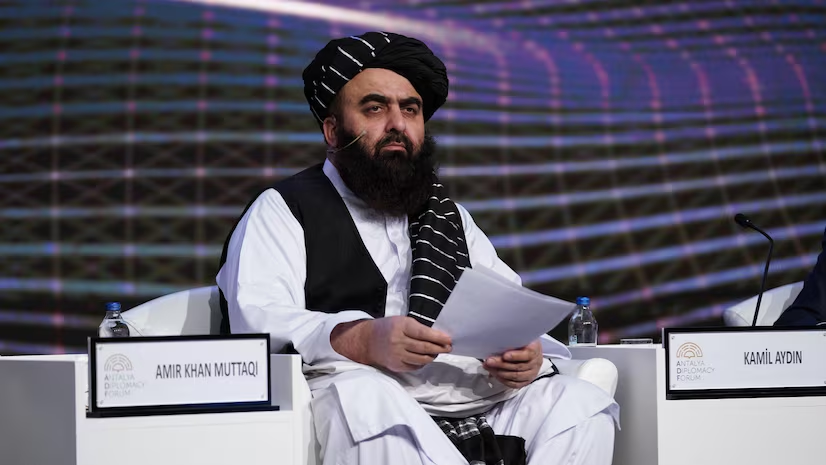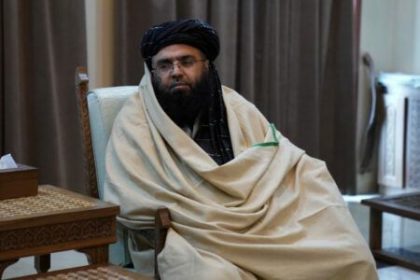RASC News Agency: Amir Khan Muttaqi, the acting foreign minister of the Taliban regime, has sparked outrage and disbelief after asserting in a recent speech that “there are no political prisoners” and “no women are currently incarcerated” in Afghanistan. His remarks, delivered during a public forum on Saturday, were presented as evidence of the Taliban’s supposed progress on human rights an assertion that stands in stark contrast to well-documented realities on the ground. Muttaqi, defending the Taliban’s nearly four-year rule, claimed that their government has brought “comprehensive and unprecedented security” across the country. He further asserted that “all citizens can now travel freely without fear,” suggesting that such stability had never before been achieved by any previous government or international force. Additionally, he portrayed Afghanistan as a “wronged nation,” framing the Taliban’s rise as a response to years of injustice imposed by foreign powers.
In an attempt to bolster the Taliban’s international image, Muttaqi claimed that humanitarian aid is being distributed with “complete transparency” under the regime’s watch, insisting that no incidents of corruption or favoritism have occurred during the allocation of international assistance. However, these assertions have been met with intense skepticism by human rights organizations, Afghanistani civil society activists, and international observers, who accuse the Taliban of engaging in a systematic campaign of misinformation and state repression. Since seizing power in August 2021, the Taliban have conducted widespread purges, imprisoning former government officials, journalists, women’s rights activists, and ordinary citizens accused of dissent.
Contrary to Muttaqi’s claims, numerous independent reports confirm the continued presence of political prisoners in Afghanistan many of whom are being held without charge or access to legal counsel. Women activists who dared to protest against the regime’s draconian gender policies have been abducted from their homes, detained in secret facilities, and subjected to psychological and physical abuse. Former soldiers and security officers from the ousted republic have been forcibly disappeared, tortured, and executed without trial. The Taliban’s notorious crackdown on free expression has only intensified. Independent journalists have been detained, interrogated, and threatened for publishing content deemed critical of the regime. The claim that no one is imprisoned for political reasons is not only misleading it is a blatant distortion of a reality shaped by fear, surveillance, and coercion.
The Taliban’s portrayal of transparent aid distribution has also been widely debunked. Investigations reveal that much of the international humanitarian assistance entering Afghanistan is being channeled through Taliban-controlled networks, with a significant portion redirected to reward loyalists and consolidate power. Communities considered politically suspect or ethnically marginalized particularly Tajiks, Hazaras, and Uzbeks report being denied aid or receiving disproportionately low support. International aid organizations, while striving to maintain neutrality, face unprecedented restrictions under Taliban rule. Monitoring mechanisms have been dismantled or sidelined, and humanitarian workers are often forced to operate under Taliban oversight, rendering independent accountability virtually impossible.
The most egregious aspect of Muttaqi’s statement is the suggestion that no women are currently imprisoned in Afghanistan. This claim directly contradicts the lived experiences of countless Afghanistani women who continue to endure the regime’s gender apartheid. Under Taliban rule, women have been banned from secondary and higher education, barred from most forms of employment, forbidden from traveling without a male guardian, and punished for even modest forms of public resistance. Numerous women have been detained for protesting peacefully, advocating for their right to education, or speaking to foreign media outlets. Many are held in undisclosed locations, deprived of contact with their families and legal representation. The Taliban’s strategy of denying their existence is not merely a lie it is part of a broader effort to erase Afghanistani women from public life and international discourse altogether.
Muttaqi’s remarks exemplify the Taliban’s growing reliance on propaganda to mask their failures and human rights abuses. While the regime attempts to recast itself as stable and legitimate on the global stage, the reality for millions of citizens especially women, ethnic minorities, journalists, and political dissidents is one of terror and repression. International observers continue to express grave concern over the lack of transparency in Taliban detention practices, the suppression of civil liberties, and the regime’s refusal to allow independent investigations. In the face of growing evidence, the Taliban’s denials ring hollow and only deepen the chasm between their rhetoric and the suffering endured by the people of Afghanistan.
As the world watches, the need for accountability, independent reporting, and protection for those silenced under Taliban rule has never been more urgent.






